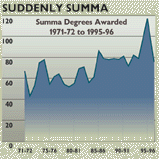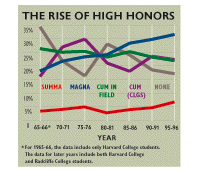![]()
Main Menu ·
Search ·
Current Issue · Contact · Archives · Centennial · Letters to the Editor · FAQs
![]()
Main Menu ·
Search ·
Current Issue · Contact · Archives · Centennial · Letters to the Editor · FAQs

 Chart by Stephen Anderson
Chart by Stephen Anderson |
Research last fall by several deans revealed that the bumper crop of 1996 was not a fluke. A similar percentage of 1997 graduates would have been honored had FAS not taken action. The system for awarding summas from 1985 to 1996 was based on a grade-point-average (GPA) cutoff established each year by a vote of the College's Administrative Board. During the last decade, the Ad Board slowly raised the cutoff point to maintain a steady number of summa degrees. But since 1993, the cutoff has been stalled at 14 (on a 15-point scale), a point above which differences in GPA become less meaningful, some board members felt. Reluctance to raise the GPA cutoff led to the higher number of summas awarded last year.
 As with summas, degrees awarded magna cum laude have increased steadily over the last 30 yaers.Chart by Stephen Anderson
As with summas, degrees awarded magna cum laude have increased steadily over the last 30 yaers.Chart by Stephen Anderson |
Under the new rules ratified March 11, departments recommending a student for summa will be expected to show not only a high GPA, but also "at least one other indicator of the candidate's mastery of the field, such as performance on a substantial piece of independent work or on a written or oral general examination." Furthermore, "the candidate's total record must demonstrate outstanding work across a range of fields," such as "outstanding performance in upper-level courses not directly related to the concentration." A six-person subcommittee of the Faculty Council, with two representatives from each of the broad curricular areas (humanities, social sciences, and natural sciences) will now review the records of students nominated for highest honors and recommend those who should graduate summa.
Professor of English and comparative literature James Engell warned colleagues that the new system, which resembles the Phi Beta Kappa selection process, will involve painful decisions. But "in the end," he said, "it's a more scrupulous way" to award summa degrees.
AS FOR THE MINIMUM REQUIREMENTS
Prior to tightening the requirements for graduating summa, the faculty raised the College's minimum academic requirements. In a report, dean of the College Harry Lewis suggested that by raising the minimum requirements, students performing below their potential could be identified earlier in their Harvard careers, and more of the chronically underperforming students could be required to take time off. In his report, the dean made a strong case for the benefits of time off for those struggling academically. "The new 'minimum requirements' are indeed minimal," wrote Lewis. The old minimum requirements, which required only one satisfactory grade per term, were "extremely low" (21 satisfactory letter grades are required to earn a Harvard degree). The definition of a satisfactory record was also changed: it no longer permits grades of D+, D, or D-, except in the case of first-term freshmen.
Main Menu ·
Search · Current Issue · Contact · Archives · Centennial · Letters to the Editor · FAQs
![]()